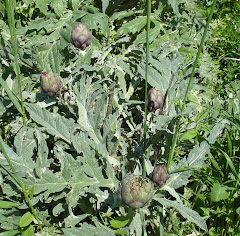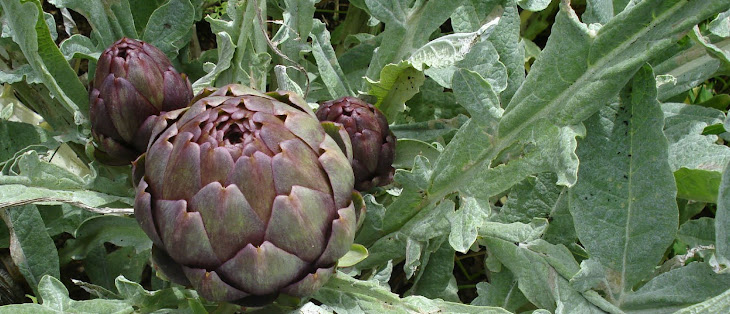
Olive oil from Le Moulin de la Garrigue, St André de Sangonis
There are 2,000 varieties of olive worldwide and 400 in France, which is responsible for a relatively small proportion of the world's olive oil production in comparison with Spain, Italy, Greece and Turkey. Spain, for instance, has 4.7 million acres of olive trees and produces 27 % of the world's oil.
Olive trees as far as the eye can see, near Cordoba in Andalucia
Here in the Hérault département of France, 10 varieties of olive are widely grown, including most commonly Lucques and Picholines. Lucques originated in Italy, but are now said to be hardly grown there. They seem to be well-suited to the environment of this area, though, and are prized for the fresh flavour of their elegant pointed fruits. They are used as table olives and also for extracting olive oil. It takes 4 to 5 kilos of olives to make a litre of olive oil.
In his poem 'Oda al Aceite' (Ode to Olive Oil), the Chilean poet Pablo Neruda said that it is not just wine that sings - 'Olive oil sings too' (También canta el aceite). Like the olive tree itself, the oil has a special place in the culture, history, mythology and cuisine of Mediterranean countries. Neruda said 'Y entre los bienes de la tierra / Aparto / Aceite' (And among the good things of the earth / I set apart / Olive oil). It is believed to have health-giving properties as part of the Mediterranean diet. I don't want to make any specific claims, but if you search the Internet for 'olive oil and health' you will be presented with a huge variety of articles of varying scientific provenance. It certainly tastes good and I love cooking with it!
Olives for oil production are harvested in November, December and January, depending on the variety. In the Hérault the harvest has just begun and today we visited Le Moulin de la Garrigue at St André de Sangonis, a small privately owned mill where they were milling oil from olives of the varieties Lucque and Verdale.
Modern buildings hidden behind mature olive trees
The process of extracting olive oil:
This is a very modern mill, with new machinery, nothing like the old stone and wood structures, the grindstones traditionally seen around the Mediterranean, driven by the hard work of animals and humans, as easygardener described seeing on Paxos in a comment on my last post, and which once existed on the hillside above our garden in Gabian. The oil tastes wonderful, as good as any - modern or traditional - full-bodied and fruity, as we found when we brought a bottle home. This kind of oil from small specialist producers is not for cooking with, but for enjoying on salads or simply dipping bread into. In the picture at the top of this post you can see what a lovely dark gold colour this oil has.


















4 comments:
Wow, what an education! Thank you. I of course wish we could grow olives here, but now I have a much better idea of why good olive oil is so costly. One question, though: What becomes of the spent olives? Are they composted? Eaten?
Hi our friend ben! Thanks for your comment. Glad you found the post useful. I think the spent olives are used as compost - they certainly wouldn't be very nice to eat, being just dry skin what's left of the flesh of the olive once the oil has been pressed. Grape skins are used here in the same way - put back on the vineyards after winemaking.
A great, interesting post about the olives and olive oil. The new mill looks quite a bit different from the old stones and mats. Here in australia we can buy now very nice, tasty, cold pressed Virgin Olive oil. Usually it comes to from "boutique" Olive groves. I think every garden, if possible, should grow an olive tree, a pomegranate tree and a figtree!
lucques are my all time favorite, good thing i live here! what an interesting post, i really should go and visit one of the mills, thank you for sharing all this great info and photos with everyone.
Post a Comment